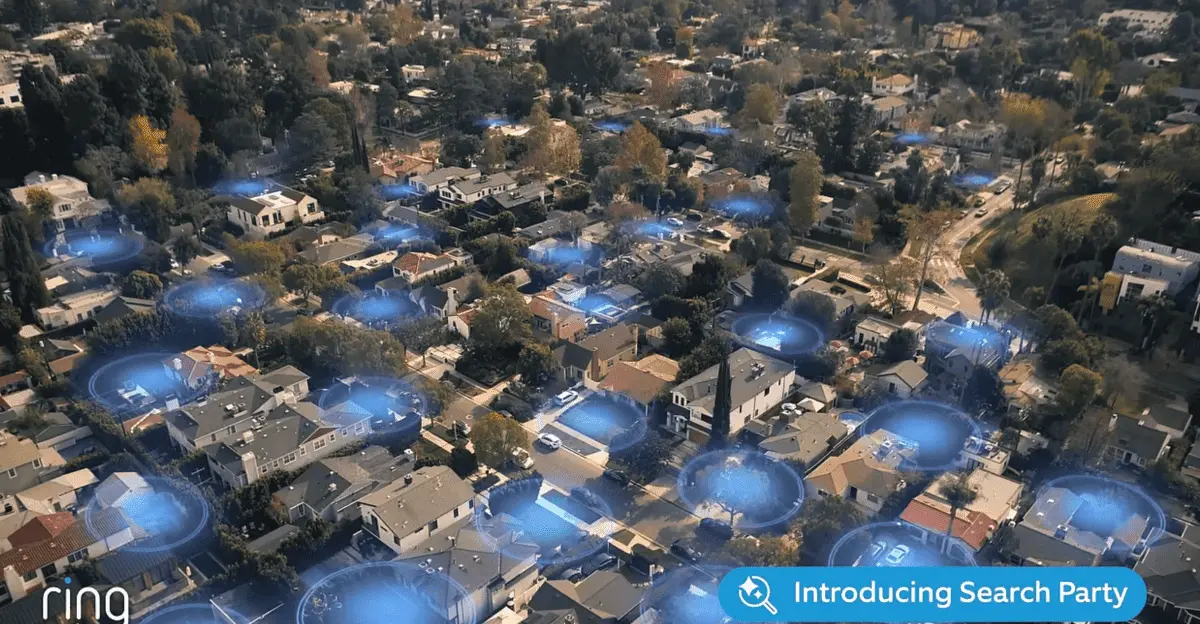Amazon's Ring Introduces Controversial Facial Recognition Feature, Sparking Privacy Concerns
2 Sources
2 Sources
[1]
Amazon's Ring plans to scan everyone's face at the door
Facial recognition technology is increasingly used in airports, police investigations and sports venues. Now Amazon's Ring says it is putting facial recognition for the first time into its home security doorbells and video cameras. It's intended to identify your sister, a neighbor or other people you know. While the feature will be optional for Ring device owners, privacy advocates say it's unfair that wherever the technology is in use, anyone within sight will have their faces scanned to determine who's a friend or stranger. The Ring feature is "invasive for anyone who walks within range of your Ring doorbell," said Calli Schroeder, senior counsel at the consumer advocacy and policy group Electronic Privacy Information Center. "They are not consenting to this." Ring spokesperson Emma Daniels said the Ring's features empower device owners to be responsible users of facial recognition and to comply with relevant laws that "may require obtaining consent prior to identifying people." (Amazon founder Jeff Bezos owns The Washington Post.) Other companies, including Google, already offer facial recognition for connected doorbells and cameras. You might use similar technology to unlock your iPhone or tag relatives in digital photo albums. But privacy watchdogs said Ring's use of facial recognition poses added risks because the company's products are embedded in our neighborhoods and have a history of raising social, privacy and legal questions. How Ring's facial recognition will work The feature called "Familiar Faces" will be available for new Ring doorbells and security cameras starting in December. The company offered few details about the feature during a product announcement and in an online post, but agreed to answer my questions. Daniels said the feature will be turned off unless the Ring device owner chooses to enable it. Then, if you see your neighbor or a friend pop up in video footage from your Ring doorbell or security camera, you can tag them in the Ring app by name or by a moniker such as "neighbor." The next time that person shows up, you can get an alert saying Emma or "neighbor" is at the door, rather than the typical notice of, "There's a person at your front door." Facial recognition features like this work by capturing the unique mathematical contours of each face, sometimes called a face template or faceprint. Each faceprint would then be compared to the previously identified faces in the Ring database, said Albert Fox Cahn, executive director of the Surveillance Technology Oversight Project, a privacy advocacy group. It's typically legal to film in public places, including your doorway. And in most of the United States, your permission is not legally required to collect or use your faceprint. Privacy experts said Ring's use of the technology risks crossing ethical boundaries because of its potential for widespread use in residential areas without people's knowledge or consent. You choose to unlock your iPhone by scanning your face. A food delivery courier, a child selling candy or someone walking by on the sidewalk is not consenting to have their face captured, stored and compared against Ring's database, said Adam Schwartz, privacy litigation director for the consumer advocacy group Electronic Frontier Foundation. "It's troubling that companies are making a product that by design is taking biometric information from people who are doing the innocent act of walking onto a porch," he said. The Ring spokeswoman said the facial recognition feature won't be available in Illinois, Texas and Portland, Oregon, and it will be restricted "as a precaution" because of other state legislation. Portland restricts use of facial recognition. Under Illinois and Texas laws, companies can face large fines unless they obtain permission to collect or use data from your body, including fingerprints and unique patterns derived from faces. Is this actually useful? Schroeder doesn't believe Ring's facial recognition will be helpful enough to justify the concerns about its use. If you needed to make sure the person ringing your doorbell was your regular house cleaner and not a possible burglar, Schroeder said that it's good enough to peek outside or check regular camera footage rather than rely on error-prone facial recognition. Cahn also said there could be risks of personal Ring databases of identified faces being stolen by cyberthieves, misused by Ring employees who might have access or shared with outsiders such as law enforcement. Ring has in the past faced allegations of lax security that enables people to hijack home cameras, and of its employees and contractors viewing people's private footage. In a 2023 settlement with the Federal Trade Commission, the company denied the claims and said it made privacy and security improvements on its own. Amazon's introduction of facial recognition may spell a reversal from a period in which large technology companies have been relatively cautious with facial recognition. Companies, including Amazon, several years ago froze or restricted police use of their facial recognition technologies after concerns about potential misuse. Meta in 2021 shut down a facial recognition feature that had led to large legal settlements over tagging people in photos without permission. And so far, big companies including Google and Meta have refrained from adding facial recognition into smart glasses. Schroeder said that increasingly capable artificial intelligence and changing public and political demands for security may be making facial recognition more palatable. "It feels like the social dynamics have really swung back in the other direction," she said.
[2]
Ring's Facial Recognition Sparks Privacy Backlash Among Customers - Phandroid
Amazon's latest Ring camera update is raising serious privacy alarms. The company unveiled a feature called Familiar Faces at its fall 2025 hardware event, and the response from customers has been swift and harsh. Some users are already canceling their Ring subscriptions rather than accept facial recognition technology monitoring their front doors. The Familiar Faces feature lets Ring owners tag people by name in their camera footage. When the system spots that person again, it sends a notification identifying them. Amazon positions this as a convenience tool to reduce unnecessary alerts from familiar visitors. However, privacy advocates and customers see it differently. The feature launches in December on Ring's new 4K camera lineup, which includes models priced between $59.99 and $499.99. Customer backlash spread quickly across social media. "Well, time to get rid of my Ring camera," one user posted on Reddit. Another said they didn't know about the feature and canceled their Ring plan immediately, switching to a competitor that doesn't use cloud storage. The concern goes beyond personal discomfort. Calli Schroeder from the Electronic Privacy Information Center told The Washington Post that the feature is "invasive for anyone who walks within range of your Ring doorbell. They are not consenting to this." Legal issues add another layer of complexity. Ring customers are responsible for complying with state laws that may require consent before using facial recognition. Amazon is already restricting the feature in Illinois, Texas, and Portland, Oregon due to existing legislation. Still, many customers worry about how Amazon might use the facial data it collects, with some Reddit users speculating the company could build databases for targeted advertising or share information with law enforcement. This controversy comes as Ring founder Jamie Siminoff returns as CEO with plans to make the company "AI first." Critics note that Ring is also reintroducing partnerships with police that allow law enforcement to request footage directly from users. For customers concerned about privacy, particularly those who previously had to disable Amazon's Sidewalk network over similar concerns, the timing couldn't feel worse.
Share
Share
Copy Link
Amazon's Ring announces a new facial recognition feature for its home security devices, leading to significant privacy concerns and customer backlash. The feature, set to launch in December 2025, has reignited debates about the ethical implications of AI in residential settings.
Amazon's Ring Introduces Controversial Facial Recognition Feature
Amazon's Ring, the popular home security company, has announced a new facial recognition feature called "Familiar Faces" for its doorbells and security cameras, sparking intense debate over privacy concerns and ethical implications
1
2
.
Source: Phandroid
How "Familiar Faces" Works
The feature, set to launch in December 2025, will allow Ring device owners to tag people in their camera footage by name or with labels like "neighbor." Subsequently, when a tagged individual appears in the camera's view, the system will send a notification identifying them
1
.Emma Daniels, a Ring spokesperson, emphasized that the feature will be opt-in, requiring users to enable it manually. The technology works by capturing unique mathematical contours of each face, creating a "faceprint" that is then compared to previously identified faces in the Ring database
1
.Privacy Concerns and Backlash
Privacy advocates argue that the technology is invasive and raises significant ethical questions. Calli Schroeder, senior counsel at the Electronic Privacy Information Center, stated that the feature is "invasive for anyone who walks within range of your Ring doorbell" as they are not consenting to have their faces scanned
1
2
.The announcement has led to a swift backlash from customers, with some canceling their Ring subscriptions and switching to competitors. Users expressed concerns about how Amazon might use the collected facial data, speculating about potential misuse for targeted advertising or sharing with law enforcement
2
.Related Stories
Legal and Ethical Implications
The legality of facial recognition technology varies across jurisdictions. Ring has preemptively restricted the feature in Illinois, Texas, and Portland, Oregon, due to existing legislation. In most of the United States, permission is not legally required to collect or use faceprints
1
.Adam Schwartz, privacy litigation director for the Electronic Frontier Foundation, expressed concern about the technology's potential for widespread use in residential areas without people's knowledge or consent
1
.Ring's Future Direction
The introduction of "Familiar Faces" aligns with Ring founder Jamie Siminoff's return as CEO and his vision to make the company "AI first." This move, coupled with the reintroduction of partnerships allowing law enforcement to request footage directly from users, has further intensified privacy concerns among customers
2
.As facial recognition technology becomes increasingly prevalent in various sectors, including airports, police investigations, and sports venues, the debate surrounding its use in residential settings is likely to continue. The balance between convenience and privacy remains a critical issue for both tech companies and consumers in the evolving landscape of smart home security.
References
Summarized by
Navi
[1]
Related Stories
Amazon Ring deploys facial recognition to doorbells as privacy experts sound the alarm
09 Dec 2025•Technology

Ring abandons Flock deal after Super Bowl ad sparks mass surveillance fears
13 Feb 2026•Policy and Regulation

Ring's Search Party Super Bowl ad triggers mass surveillance fears and widespread backlash
10 Feb 2026•Entertainment and Society

Recent Highlights
1
Google Gemini 3.1 Pro doubles reasoning score, beats rivals in key AI benchmarks
Technology

2
Meta strikes up to $100 billion AI chips deal with AMD, could acquire 10% stake in chipmaker
Technology

3
Pentagon threatens Anthropic with supply chain risk label over AI safeguards for military use
Policy and Regulation





